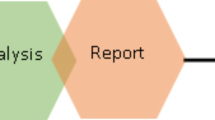Abstract
In recent years, the use of electronic assessment platforms (EAPs), which allow exams to be administered on- or off-line, has become increasingly popular. A benefit of EAPs is that they capture a detailed log of an examinee’s journey through their exams. However, methods of leveraging exam logs for developing analytical insights are still under-explored. In this paper, we employ AI and analytical techniques to investigate whether exam-takers exhibit distinct behaviours while taking e-exams. We evaluate our methods using an e-exam log of 90 multiple-choice questions administrated to 463 university-level medical students. Our findings indicate that the students exhibited distinctive test-taking tactics and strategies, and some of the tactics are associated with their performance. We discuss the implications for analytical techniques to support instructors’ decisions in AI-supported EAPs and e-exams.
Access this chapter
Tax calculation will be finalised at checkout
Purchases are for personal use only
Similar content being viewed by others
Notes
- 1.
Approval from our Human Research Ethics Committee was received for conducting the study presented in this paper (2018000841).
References
Ahmad Uzir, N., Gašević, D., Matcha, W., Jovanović, J., Pardo, A.: Analytics of time management strategies in a flipped classroom. J. Comput. Assist. Learn. 36(1), 70–88 (2020)
Bumbálková, E.: Test-taking strategies in second language receptive skills tests: a literature review. Int. J. Instr. 14(2), 647–664 (2021)
Cleophas, C., Hoennige, C., Meisel, F., Meyer, P.: Who’s cheating? Mining patterns of collusion from text and events in online exams. Mining Patterns of Collusion from Text and Events in Online Exams, 12 April 2021
Costagliola, G., Fuccella, V., Giordano, M., Polese, G.: Monitoring online tests through data visualization. IEEE Trans. Knowl. Data Eng. 21(6), 773–784 (2008)
Effenberger, T., Pelánek, R.: Visualization of student-item interaction matrix. In: Visualizations and Dashboards for Learning Analytics, pp. 439–456. Springer (2021). https://doi.org/10.1007/978-3-030-81222-5_20
George, T.P., Muller, M.A., Bartz, J.D.: A mixed-methods study of prelicensure nursing students changing answers on multiple choice examinations. J. Nurs. Educ. 55(4), 220–223 (2016)
Hong, E., Sas, M., Sas, J.C.: Test-taking strategies of high and low mathematics achievers. J. Educ. Res. 99(3), 144–155 (2006)
Jovanović, J., Dawson, S., Joksimović, S., Siemens, G.: Supporting actionable intelligence: reframing the analysis of observed study strategies. In: The 10th International Conference on Learning Analytics & Knowledge, pp. 161–170 (2020)
Papamitsiou, Z., Economides, A.A.: Exhibiting achievement behavior during computer-based testing: what temporal trace data and personality traits tell us? Comput. Hum. Behav. 75, 423–438 (2017)
Papamitsiou, Z., Karapistoli, E., Economides, A.A.: Applying classification techniques on temporal trace data for shaping student behavior models. In: Proceedings of the Sixth International Conference on Learning Analytics & Knowledge, pp. 299–303. LAK 2016. ACM, New York, NY, USA (2016)
Pechenizkiy, M., Trcka, N., Vasilyeva, E., Van der Aalst, W., De Bra, P.: Process mining online assessment data. International Working Group on Educational Data Mining (2009)
Winne, P.H.: Learning strategies, study skills, and self-regulated learning in postsecondary education. In: Paulsen, M.B. (ed.) Higher Education: Handbook of Theory and Research, Higher Education: Handbook of Theory and Research, vol. 28, pp. 377–403. Springer, Dordrecht (2013). https://doi.org/10.1007/978-94-007-5836-0_8
Wise, S.L.: Rapid-guessing behavior: its identification, interpretation, and implications. Educ. Meas. Issues Pract. 36(4), 52–61 (2017)
Author information
Authors and Affiliations
Corresponding author
Editor information
Editors and Affiliations
Rights and permissions
Copyright information
© 2022 Springer Nature Switzerland AG
About this paper
Cite this paper
Lahza, H.F., Khosravi, H., Demartini, G. (2022). Incorporating AI and Analytics to Derive Insights from E-exam Logs. In: Rodrigo, M.M., Matsuda, N., Cristea, A.I., Dimitrova, V. (eds) Artificial Intelligence in Education. AIED 2022. Lecture Notes in Computer Science, vol 13355. Springer, Cham. https://doi.org/10.1007/978-3-031-11644-5_78
Download citation
DOI: https://doi.org/10.1007/978-3-031-11644-5_78
Published:
Publisher Name: Springer, Cham
Print ISBN: 978-3-031-11643-8
Online ISBN: 978-3-031-11644-5
eBook Packages: Computer ScienceComputer Science (R0)




